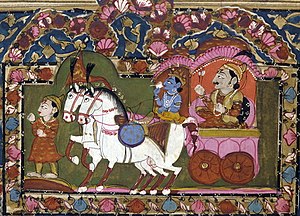Hi ! Here is the recent issue from the series of Pride of India Collection. The new issue featuring stamp on famous shlok from Bhagwadgita, one of the most famous religious and philosophical books of Hindus. The original stamp of Gold replica shown above was issued on 25 August 1978. The stamp is magnificent in golden and orange color and is one of the best stamps issued by India Post ! This is all for Today….Till Next Post….Have a Great Time !
Krishna and Arjuna in Battle Chariot
Date of Issue – 25 August 1978
For more details log on to http://www.prideofindiacollection.com/
In Devnagari:
कर्मण्ये वाधिकारस्ते म फलेषु कदाचना
कर्मफलेह्तुर भुरमा ते संगोस्त्वकर्मानी॥
This is the most famous verse (2.47) of the Bhagavad Gita. Many people have not read the Gita, but they are familiar with this shloka.
In English transliteration:
Karmanye vadhikaraste ma phaleshu kadachna
Karmaphalehtur bhurma te sangostvakarmani.
Ch. 2, 47
In English translation:
You have a right to perform your prescribed duty, but you are not entitled to the fruits of action। Never consider yourself the cause of the results of your activities, and never be attached to not doing your duty.
Philosophy
The shloka (and the philosophy of Karma Yoga) tells us to renounce the fruits, or results, of our actions. Exactly what are these "fruits"? In a narrow sense they could be tangible gains – like a salary hike or a promotion. In a broader sense they could be the achievement of one's life's ambitions – like wealth, fame or power. These are the things people usually mean when they talk about "fruits" or "results".
There is another, more fundamental, "fruit" of action that is seldom talked about in this context: the happiness, the satisfaction and the peace of mind that one gets from work. Does "fruits of action" include these as well? Is Krishna telling us that we should renounce these also?
Imagine doing a work and saying no even to the joy that we get from it. It is one thing to do good work letting go of money, power and fame. It is another thing to do it letting go of even the happiness that it gives us. Doesn't this sound heartless? Yes, it does. Some would argue that the satisfaction and peace of mind we get from good work are an intrinsic part of that work, and should not be seen as "fruits" of work. But if we really think about it, we realise that these are also "fruits" of work, and hence should be renounced.
Which brings us to perhaps the most fundamental, the most primordial, "fruit" of work – the sense of meaning and purpose that one derives from it. Are we to renounce this as well? Yes, that is what the Bhagavad Gita is telling us. This is Karma Yoga at its most severe level: working purely for the sake of work, and not for any other reason. The work itself is its own justification, and nothing else.
Krishna & Arjuna at Kurukshetra
The Bhagwad Gita
The Bhagavad Gita ("Song of God"), also more simply known as Gita, is a sacred Hindu scripture, considered among the most important texts in the history of literature and philosophy. The Bhagavad Gita comprises roughly 700 verses, and is a part of the Mahabharata. The teacher of the Bhagavad Gita is Krishna, who is revered by Hindus as a manifestation of God himself, and is referred to within as Bhagavan, the Divine One.
The content of the Gita is the conversation between Krishna and Arjuna taking place on the battlefield before the start of the Kurukshetra war. Responding to Arjuna's confusion and moral dilemma about fighting his own cousins, Krishna explains to Arjuna his duties as a warrior and prince and elaborates on different Yogic and Vedantic philosophies, with examples and analogies. This has led to the Gita often being described as a concise guide to Hindu theology and also as a practical, self-contained guide to life. During the discourse, Krishna reveals His identity as the Supreme Being Himself (Svayam Bhagavan), blessing Arjuna with an awe-inspiring vision of His divine universal form.
http://en.wikipedia.org/wiki/Bhagavad_Gita























.jpg)














1 comment:
Nice stamp! And nice post :-)
Post a Comment